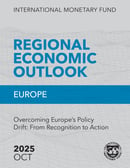This web page presents information about the work of the IMF in the Republic of Moldova, including the activities of the IMF Resident Representative Office. Additional information can be found on the Moldova and IMF country page, including IMF reports and Executive Board documents that deal with the Republic of Moldova.
At a Glance
- Current IMF membership: 191 countries
- Republic of Moldova joined the Fund in August 12, 1992
- Republic of Moldova and the IMF
- Quota: SDR 172.5 million
- The last Article IV Consultation (Country Report 2023/428) was concluded on December 7, 2023
Office Activities
(PDF in English, Romanian and Russian)
December 1, 2025
NBM opens a new chapter for women's leadership in the Republic of Moldova
March 21, 2025
(PDF in English | Romanian | Russian)
March 7, 2025
December 19, 2024
(PDF in English, Romanian and Russian)
September 27, 2024
IMF’s Work on the Republic of Moldova
No results found. Either there was an error with the web service or there is no data returned by the web service.
Regional Economic Outlook
October 17, 2025

Europe’s growth is slowing and debt rising. Closing the productivity gap with the US is firmly in Europe’s grasp. Discussions need to move from recognition to action: deepen integration, raise productivity and secure long-term fiscal sustainability.
Read the Report



